I hate dehorning dairy calves. I also hate taking my kids in to the doctor for shots. However I know that the future health and well being of both my cows and my kids means that sometimes there is a little pain to protect them down the line. As a mom and a farmer it is my job to make both calves and kids as comfortable and painless as possible when faced with unpleasant situations.
Dairy cows are born with horns.
Horns. You know those things rodeo bulls have? The Texas Longhorns have them too. So do most dairy cattle, even the girls. Horns on cows are not like antlers on deer. Both male and female cattle grow horns and cattle do not shed their horns seasonally. Despite the cow toy industries seeming need to place horns on every stuffed Holstein, I bet most people have never seen a dairy cow that has horns.
I hope I am not confusing you. Yes, I said that most dairy cows have horns naturally and I also said that it is very rare to see a dairy cow that has horns. How can this be? The simple answer is that dairy farmers dehorn dairy cows.
Do you have to dehorn calves?
Dehorning dairy calves is one of the most hated jobs on our farm and I would be willing to bet that there isn't a farmer out there that enjoys doing it. However, it is a very necessary job on a dairy farm. Cows with horns are not only more dangerous for farmers to work around, they also are dangerous to each other and to facilities. Don't believe me? Imagine this cow fight with horns. Not pretty. Pokey, pointy, hard things attached to 1500lbs animals does not work out well. This is why dehorning dairy calves is so important.
Is dehorning painful?
It's extremely important to do this job correctly. We want to absolutely minimize and pain that comes with this procedure. Calves are born with small horn buds. A horn bud is tissue that a horn will eventually grow from. At birth the horn bud isn't yet fully connected to the body, meaning that dehorning young calves, before the horn bud is fully connected helps to minimize pain. Not only is it important to dehorn when the horn bud is small, reducing pain for the calf, calves are easier to work with due to size.
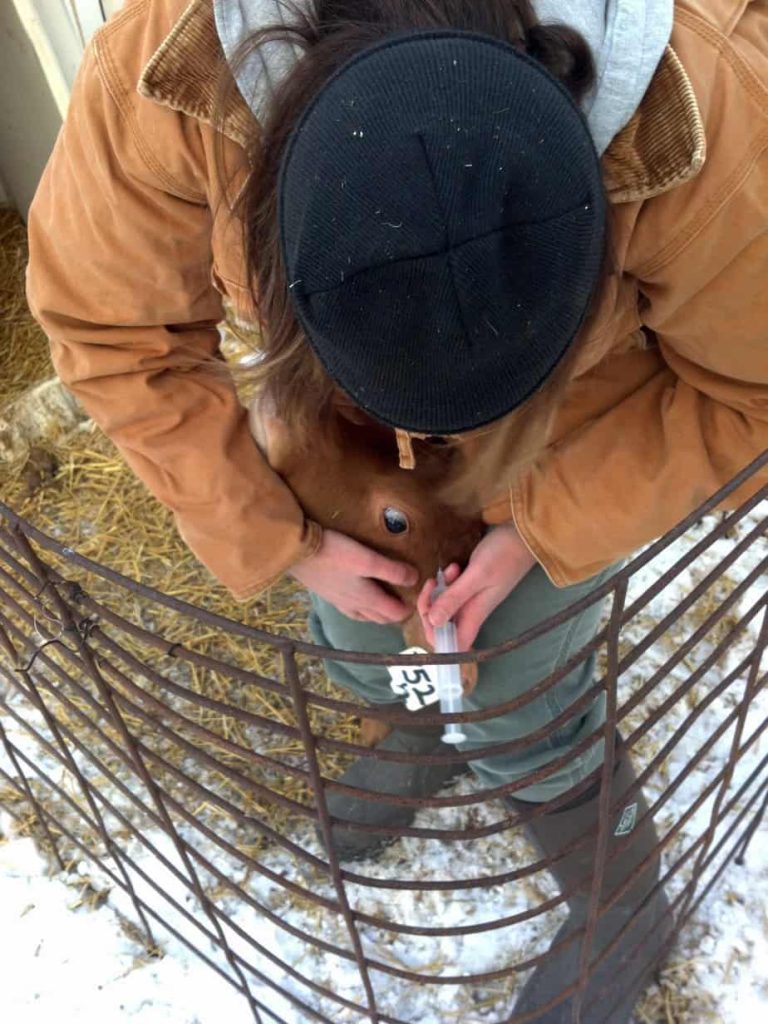
Pain control for dehorning dairy calves.
On our farm we start the dehorning process by giving a long lasting pain medication an hour before we dehorn. We also use Lidocaine, it's the same type of medicine the dentist uses before they start drilling on a cavity. The Lidocaine helps to numb the area and makes the dehorning much less painful for the calf and the long lasting pain medicine takes over after the Lidocaine has worn off. Not only is using pain management the best practice for our calve's sake, it is also required by the FARM Program, which is responsible for ensuring humane animal care on dairy farms. You can read more about the FARM Program by clicking HERE.
Our goal is to make dehorning as low stress and as least painful as possible for our calves. We want our calves to be happy and healthy and to grow up to be happy healthy cows. The tool we use to dehorn our calves uses heat to cauterize the blood flow to the horn so it doesn't grow. What this means is that it gets really, really hot and you put the metal tip on the horn bud. It doesn't feel good for the calf. Which is why we numb the area ahead of time. I am sure a horn being used as a weapon against you wouldn't feel good either. I believe this is the lesser pain.
How do you dehorn a calf?
On our farm we use a butane dehorner. The metal tip of the dehorner is hot and cauterizes the horn bud tissue preventing it from growing. Some farms use a caustic paste to cauterize the tissue instead of heat cauterization.
After being dehorned I watch my calves extra careful and give them extra love. The horn bud will develop a scab and as it heals it will get itchy. I always try to give the calves a few extra scratches when I feed them when they get to this stage. They sure seem to appreciate it. I wish that dehorning didn't have to happen and we are making big steps in the dairy industry to phase the needs out.
Polled genes are making a big difference in dehorning dairy calves.
Right now more and more attention is being paid to using "Polled Genetics" on farms. A "polled" animal is an animal that is missing the gene that tells the calf to grow horns. Farmers can now include polled genetics in the list of attributes they look for in a bull. It takes time to build a 100% polled herd but farms are getting closer all the time. I know I am looking forward to the day I can cross this job off the list forever.

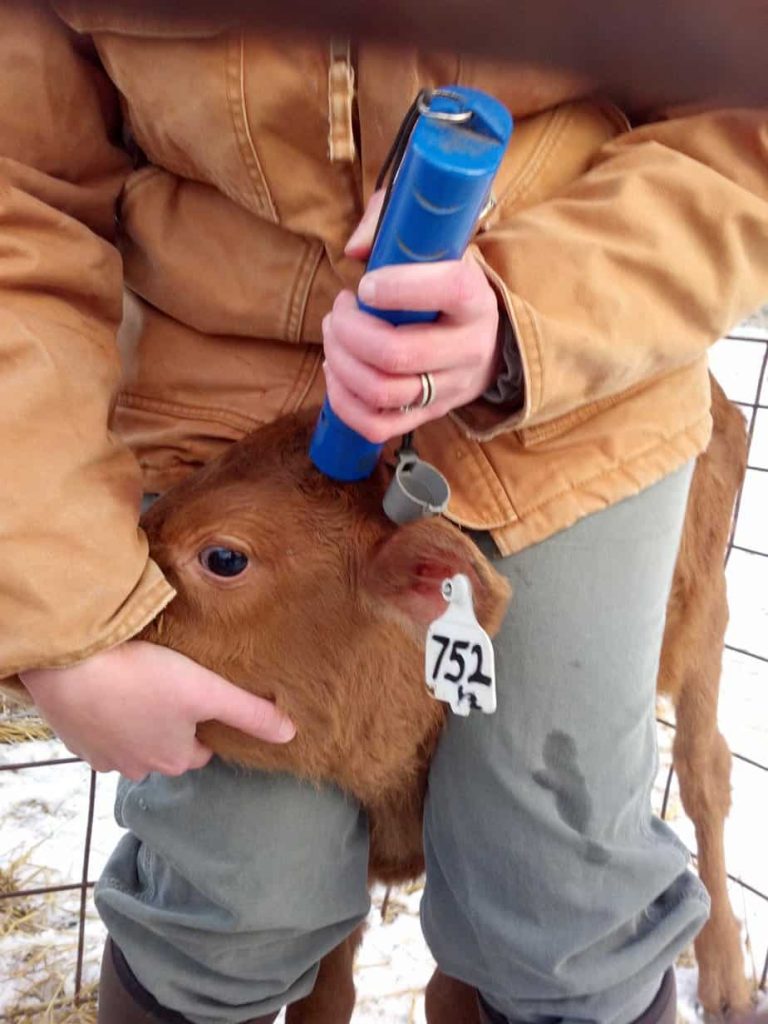
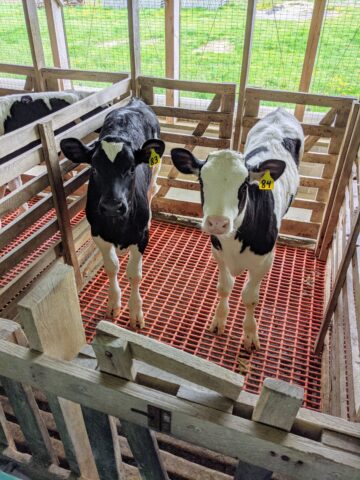
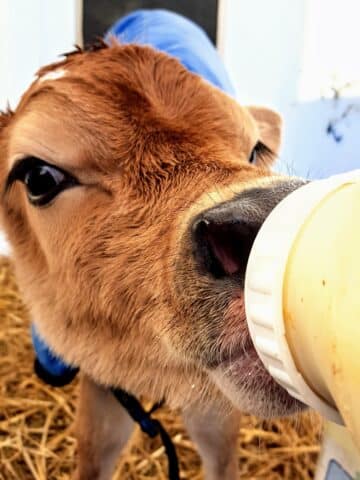
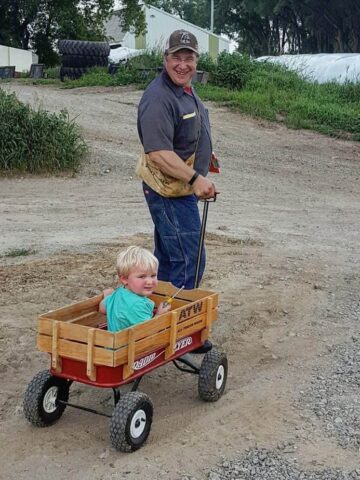
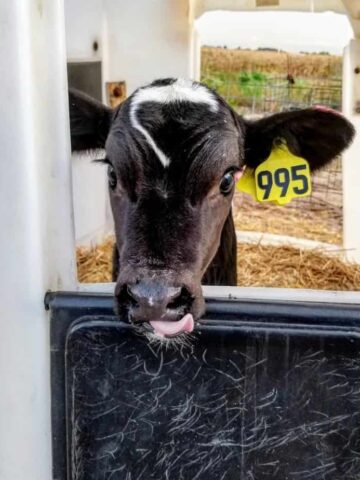
funwithbulls
Cows with horns are cute 😉
DairyCarrie
Some how I am going to make this comment bite you in the ass somewhere down the line 😉
Eric Danzeisen
Haha. I'm just trying to make your top comenter of 2012! It was a good post. Would have been better if you spent time thinking about it while shampooing tho.... 😉
DairyCarrie
I wish I could have found a better video of cows fighting. Like when the boss cow comes up to the feed bunk and tosses a little cow with her head. You would be amazed at the videos that come up when you search for 'cow fight"
Bryan Quanbury
Great Blog Carrie. Catchy title! You bring both sides to the issue. The selection of Polled Genetics is improving everyday.
DairyCarrie
I thought about the title for awhile and decided to go with the tongue in cheek version. I am thankful that the polled gene pool is growing. I really believe that polled animals is the way of the future in dairy cattle.
Steph
We tried the burning method but always had a problem with them growing back. We cut them still, yes the old method used by many years ago. Caccinate and dehorning is one of our biggest spring and fall jobs. So glad when we have that job done! We have always had really good luck with doing it this way. I know everyone has their own way to do this, just like no two farmers are alike in their ways of farming. We are also very excited to find the polled ones that get slipped in there! I would love it if there were more polled!!! Although I do kind of like the looks of a Texas Longhorn I do not think I would be able to handle them, but they sure are kind of neat looking! Great informative post!
Eddie Borst (@eddieborst)
I had a hard time finding this post all I had was the link for #Non Dairy Carrie. I am glad to see more educating coming from you. You are definately an #Agvocate!
Barnyard Barbie
I litterally laughed out loud when I read this (well the beginning). Love it! keep them coming 🙂
Robin M
My husbands family has had a dairy farm for more than 50 years. Every single one of our dairy herd (Holsteins) have their horns. We have never had a serious injury to a family member or herd member due to their horns. We have had to trim a horn here and there due to a dangerous growth pattern but other than that they all have their natural horns.
dairycarrie
Thanks for sharing Robin. I am very glad that your husband's family has been fortunate enough to not have any major injuries. However I do believe that their farm would be the exception to the rule.
Meezer3
Thanks so much for answering that question for me.
I have always had this "want" to learn more about farming, and although my family years ago were farmers, I am long removed from it. The American Farmer is my "hero"..hard, dangerous work and when crops fail it can be the end for some.
I did have a "eye opening" experience at a large commerical dairy farm with thousands of Holsteins. Cows milked on a carousal and calves being born in front of me. Keep your comments posted so we all can -learn more-.
dairycarrie
Thanks for reading and commenting! I will continue to share life on our farm and try to answer any questions I can.
Chris
Hello, Carrie. I chanced upon your blog with research a question from my student. And somehow I believe you are a real person since you don’t know what can exist online, right. Your writing is clear and easy to read and understand.
Tho I don’t eat meat, I hope your life is good now. Take care.
Ann Tannreuther
We don’t have cattle anymore but I hated dehorning day with a passion. I knew it was best for the calves but we only did ours once a year so that meant that some of the calves were almost a year when their horns were cut off. I miss our cattle but I sure don’t miss dehorning day.
dairycarrie
I'm definitely glad we've improved how we dehorn cattle over the years! So much better for them and us to do it when they are younger.
Cheryl
We bought a horned dairy cow…I wish I could show the pics of what she did to pretty much all of our other cows…there was bloody marks on most of them…she ended up losing her horns.
Cynthia R.
Nice writeup. My mother used to do all our dairy calves that we raised years ago. Though we were not a cattle farm, it’s common for goat farms to get baby calves to raise with the excess goat milk. Of course, being pretty used to doing this on goats, we easily adapted to calves. Goats do come in polled, btw, but there is a sex-linked problem in breeding polled-polled that produces hermaphrodites at a high rate, so off the table for goats.
One thing my vet told me regarding lidocaine, which I was surprised to learn she uses but we never have. She said it can be a tradeoff with the pain of the lidocaine (it burns) vs. just going ahead and doing the procedure. I have noticed that goat kids react much less -almost nothing, as if the nerves are gone- when I go back to finesse the job (I take my time and go by appearance, also give them a break). She said she was unfortunately mandated to use it, but would prefer not to add another medical aspect to the whole process.
It is overall a big kindness to the animal. I have seen broken ones and you wouldn’t believe the amount of blood and pain. Horns may be “natural”, but we are not keeping animals naturally in confinement, close to others, in fences, and needed to be managed by people. Plus, mother nature can be brutal whereas we farmers try to be kind and humane to the animals.
Kathleen
Thanks for sharing that interesting information about polled goats!! I had no idea there was a problem with hermaphroditeism in goats!
Ron
Calves are not BORN WITH horns.
dairycarrie
Yes they absolutely are. They may not be large, but you can feel the horn buds from birth.
Eleanor
I am not a farmer, but I was watching an episode of the Yorkshire vet in which he dehorned the calf and it sent me on a spiral down the internet. First to find out if it was painful, how and why it’s done etc. Then i came across this blog, and i’ve got to say its the most informative page I have been on relating to this subject. You explained every question I had and made me understand why it us done. Thank you for this!
Mike Tyson
Hi great article I came here from Tik Tok because I never knew dairy cows were born with horns! It is now 2023 and It’s been over 11 years since this article was written I’m wondering if most if not all cows are now polled?
Alli
I have 3 calves right now, looking into polling them shortly as they are about 2 months old. However reading your comments and blog, we should feel them at birth? I don’t feel them in any of mine…does that mean they don’t have them? When is the best age to poll them? I didn’t see that on the page.
Thanks!!!
Don'tHaveACowMan
lmao you can’t turn your calves into polled calves after they have been born. You have to breed cows with the proper genetics for them to be born polled. Polling is the process of breeding animals without horns from a breed that traditionally have ancestry with horns.